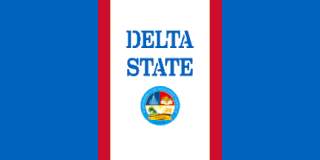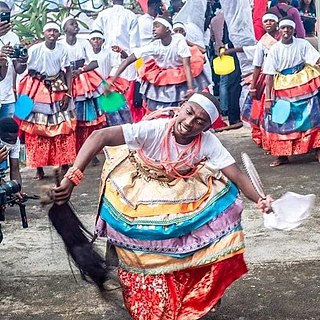Rose Oro Aziza (born 1956) is a Nigerian linguist. She is Professor of Linguistics, Head of Department of Languages and Linguistics and Director of the Urhobo Studies Programme at Delta State University (DELSU). [1]
Rose Oro Aziza (born 1956) is a Nigerian linguist. She is Professor of Linguistics, Head of Department of Languages and Linguistics and Director of the Urhobo Studies Programme at Delta State University (DELSU). [1]
Rose Aziza was born on 11th March 1956. She went to St. Maria Goretti Girls Grammar School in Benin before studying English at the University of Ife, graduated in 1976. She studied for a MA in Linguistics at the University of Ibadan from 1979 to 1980. She studied for a Postgraduate Diploma in Education from the University of Benin from 1987 to 1988. In 1997, she gained a PhD in linguistics from the University of Ibadan. [1]
Aziza taught English at several secondary schools before joining the English Department of the College of Education, Warri. In 1999, she joined the Department of Languages and Linguistics at Delta State University, becoming Head of Department in 2000. She became a Professor in 2007. In 2010 she was elected Dean of the Faculty of Arts, the first female elected Dean at the university. In March 2015 Aziza became Deputy Vice Chancellor of DELSU. [1]

Delta State is a state in the South-South geopolitical zone of Nigeria. Named after the Niger Delta—a large part of which is in the state—the state was formed from the former Bendel State, on 27 August 1991. Bordered on the north by Edo State, the east by Anambra and Rivers states, and that south by Bayelsa State while to the west is the Bight of Benin which covers about 160 kilometres of the state's coastline. The state was initially created with 12 local government areas in 1991, but was later expanded to 19 and now has 25 local government areas. Its capital city is Asaba which is located along the River Niger on the northeastern end of the state, while the state's economic center is the city of Warri on the southwestern coastline.

The Itsekiri are an ethnic group who mainly inhabit Nigeria's Niger Delta area. They speak a Yoruboid language and can be found in Ondo, Edo and Delta State. The Itsekiris presently transcends a population of over 1 million people and live mainly in parts of Ondo, Edo and majorly in the Warri South, Warri North and Warri South West local government districts of Delta State on the Atlantic coast of Nigeria.
Joseph Chike Edozien, CFR, JP was a Nigerian traditional ruler who is the Asagba of Asaba or King of Asaba, Delta State.
The Edoid languages are a few dozen languages spoken in Southern Nigeria, predominantly in the former Bendel State. The name Edoid derives from its most widely spoken member, Edo, the language of Benin City, which has 30 million native and secondary speakers.
Kay Williamson, born Ruth Margaret Williamson, was a linguist who specialised in the study of African languages, particularly those of the Niger Delta in Nigeria, where she lived for nearly fifty years. She has been called "The Mother of Nigerian Linguistics" and is also notable for proposing the Pan-Nigerian alphabet.

Grace Alele-Williams OON, FMAN, FNAE was a Nigerian professor of mathematics education, who made history as the first Nigerian woman to receive a doctorate, and the first Nigerian female vice-chancellor at the University of Benin.
E. Nolue Emenanjo was a Nigerian academic scholar, professor, writer and critic who is regarded as a central figure of Igbo literature. His book, A Grammar of Contemporary Igbo: Constituents, Features and Processes (2015), strongly added input to research of Igbo literature and culture. Along with his publications, his Igbo Language and Culture (1975) and Elements of Modern Igbo Grammar (1978). Later books include Auxiliaries in Igbo Syntax (1985) and Multilingualism, Minority Languages, and Language Policy in Nigeria (1990). In the 21st century, Emenanjo is often referred to as the "father of Igbo literature", alongside Tony Ubesie and others.

Ambrose Folorunsho Alli was a Nigerian medical professor who served as Executive Governor of the defunct Nigerian state of Bendel State between 1979 and 1983. He was the first civilian governor.
The Itsekiri language is a major branch of the Yoruboid group of languages, which as a group, is a key member of the Volta–Niger sub-family of the Niger–Congo family of African languages. Itsekiri is spoken by nearly 1,000,000 people in Nigeria as a first language and by many others as an additional language notably in the Niger Delta and in parts of Edo and Ondo states of Nigeria. The other key members of the Yoruboid group are Yoruba and Igala along with the various Yoruba dialects spoken in Benin and Togo.

The Delta State University, Abraka - popularly known as DELSU - is a State government-owned university in Nigeria with the main campus located at Abraka, Delta State and its sub-campus at Oleh. The Oleh campus was established with the 1995 Amended Edict. The university is a multiple-campus university having two campuses within a distance of about 52 km apart. Currently, with a student population of about 22,000, the university offers a range of programmes from the full-time certificate, diploma and degree programmes to part-time evening and weekend degree programmes. DELSU offers postgraduate studies up to a doctoral level. DELSU owns a staff/student counselling centre, an e-learning centre, student accommodation and sporting facilities amidst other infrastructures. It is one of over twenty-five state-owned universities which are overseen and accredited by the National Universities Commission.
Demas Akpore was the first elected Deputy Governor of Bendel State (1979–1983), the Principal of Government College, Ughelli, and the founder and principal of Orogun Grammar School.
Samuel Olatunde Emiko Bajah was science teacher and author. He co-wrote Chemistry: A New Certificate Approach with Arthur Godman.
Patrick Aziza was the first military Governor of Kebbi State, Nigeria after it was split off from Sokoto State on 27 August 1991 during the military regime of General Ibrahim Babangida.
The Urhobos are people located in southern Nigeria, near the northwestern Niger Delta. They are the major ethnic groups in Delta State. The people in this ethnic group speak the Urhobo language. Their population is approximately 7 million.
Akpor Pius Ewherido was a Nigerian politician. He was elected Senator for Delta Central Senatorial District in the April 2011 national elections, running on the Democratic People's Party (DPP) platform.

Hussey College Warri is a secondary school located along Upper Erejuwa Road in Warri, Delta State, Nigeria. It is one of the oldest and most prestigious colleges in Delta State and Nigeria, having produced many notable figures in the Nigerian professional and political scenery. The school has literally raised several generations of Nigerians from all tribes and backgrounds and schooled them in the best tradition of scholarship, athleticism, citizenship and morality. The 60th anniversary celebration of the foundation of Hussey College, Warri was organised by the Old Students Association in 2007.
According to the language family tree classification by Ethnologue, Okpe, Urhobo and Uvwie, alongside Eruwa and Isoko, make up the five Southwestern Edoid languages of the Benue-Congo group. Quoting Johnstone (1993), Ethnologue puts the population of Urhobo people at 546,000, Okpe 25,400 (2000) and Uvwie 19,800 (2000). These three languages have geographically neighbouring languages: Izon and Itsekiri to the west and south, Ukwuani and Isoko to the east and Edo to the north. Thus, Isoko and Urhobo are similar languages that belong to the same linguistic family.
M. G. Ejaife was an Urhobo nationalist from Okpara Inland and the first principal of the premier Urhobo College Effurun, Uvwie. He was one of two recipients of scholarship awards from Urhobo Progress Union during World War II years. He returned to Nigeria after his graduation with a B.A. degree of Durham University in 1948, thus becoming the first Urhobo graduate. He then became the founding Principal of Urhobo College, Effurun. He brought that famous secondary school to its great heights in many fields. Mr. Ejaife later served in many other capacities in Urhobo affairs. He was Urhobo's first Senator, serving with distinction in Nigeria's Upper Chamber during the country's First Republic.
Omafume Friday Onoge was a Nigerian professor of sociology and social anthropology as well as an activist.

Onigu Otite was a Nigerian sociologist. He was among the first set of students to attend the first indigenous Nigerian university - University of Nigeria, Nsukka. He wrote several books including The Urhobo People, On the Path of Progress, Ethnic Pluralism and Ethnic Conflicts in Nigeria, and Introduction to Sociology which he co-authored with William Ogionwo. The Urhobo Studies Association USA Chapter regard him as one of the earliest Urhobo scholars to focus attention on the culture and history of the Urhobo People of the Niger Delta.